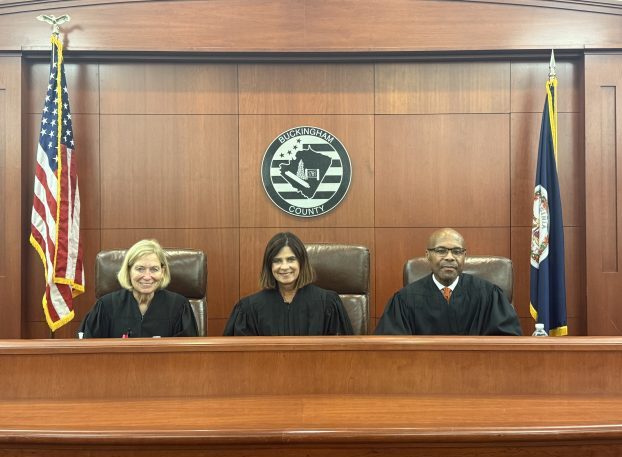The Day Record Stores Died
Published 5:25 pm Tuesday, April 30, 2013
FARMVILLE – One day the music was there.
Perry Carrington could hold it in his hands.
He could fill his Main Street store with it and people would drive for miles to buy it, to hold it, feel it, take it home and play it.
And then the music was gone-poof-just like that, abracadabra, disappearing into thin digital air right before his eyes and all around his ears.
Carrington's Music hardly held a melody. He could barely even order one. Not a record, not a CD.
On some days it seemed all the music inside Carrington's Music was inside Carrington's head, on the tip of his tongue.
No digital revolution could take that music from him-an accomplished musician and vocalist-but it took all the rest.
“Back in the heyday, I was ordering music at least three times a week,” Carrington recalled. “So for a small town like Farmville I was spending four to five thousand dollars a week buying music. So if you came in the store any given day it didn't really matter because I would have it either the next day or the day after because I was ordering two or three times a week.”
Big time.
Carrington was a major player in the business of retail music. He does not exaggerate. Call him on Monday and the CD was in your hands on Tuesday. A record store in New York or London couldn't top him.
But that was back in the day.
And then that day turned to night.
Two numbers tell it all.
The numbers are 5,000 and 100.
And two words add to the understanding.
The words are “week” and “month.”
Carrington, who retired earlier this year, puts them into this equation to explain how dramatically and emphatically the business of selling records and CDs became the business of not selling records and CDs:
The volume of business at Carrington's Music, he said, “went from $5,000 a week to around $100 in a month when I closed the music side of it out.”
Five grand a week for a store on Main Street in Farmville, five thousand smackers worth of CDs, and then $25 a week.
The stock market crash of 1929 has a companion-the nationwide free fall of music retailers when the digital age suddenly allowed everybody to buy whatever song they wanted, whenever they wanted to and wherever they happened to be.
“It was just impossible,” Carrington said. “No one wanted music. They didn't want the CDs. Everybody was downloading them to their phone, to their iPads or iPods, or whatever, and no one wanted a hard copy. Just some diehard fans that wanted to see a CD or whatever.”
Despite the passing of a handful of years, Carrington still shakes his head at the staggering swoosh of it all. Here today, gone, truly, tomorrow.
“It's amazing the things you see happen and it happened right in front of your face,” he said, still trying to make sense of it. “I can remember when LPs went out. I had a store full of them so I had the option of sending them back and getting credit for them or hanging on to them and seeing what you could do with them. I took the option of hanging on. Everybody's going to want LPs. It didn't work that way. It took me about five years to get rid of them. I had to sell them for 25 cents a-piece just to move them out of the store.”
Yes, but surely CDs would never go out of style.
Drumroll, please.
Ratta-tat-tat-tat!
Later.
As in never.
At least for music stores like Carrington's. Yes, you can still find CDs at mega stores, chains that sell a thousand other things. But Carrington's Music had to become something else.
“It's gone and I don't understand it. I saw it happen. I lived it,” he said.
“I never would have thought that albums would have gone away, that CDs were going to be the thing,” he said, still marveling, “and then all of a sudden CDs are no longer around, you just download it to your phone. But I guess I can understand the public-if you only want one song and don't want the whole LP, or the whole CD, you can download it for 99 cents and never leave your home.”
Carrington's daughter, Bridget, who teamed with Grammy-winner John Legend on ABC's Duets last year is coming out with her own recording, but her father couldn't have sold it in his own store.
"She's come out with a single and she's got an album that's getting ready to come out,” Carrington said, “but there are no hard copies.”
Carrington, whose own life is still filled with performing and recording music-the digital age allows him to do that in a room in his Farmville home-can name the day the music industry's retail business changed.
And changed irrevocably, creating an environment in which stores like Carrington's Music would never recover because suppliers up the music-selling chain would never recover.
“Eventually, music would die. And to me it died the same day the World Trade Center was attacked. It looked like everything happened 2001, September 11. And I guess what happened was right after that it was hard to get inventory. Airplanes had stopped flying. And it looked like everything ceased to exist,” he said. “It started going down hill right there.
“The suppliers also got the same hit that we did so if you weren't a major, major company they also got lost in the transition. So a lot of the people who I used to deal with went out of business,” Carrington explained. “At one point, any type of music we could find. I had different suppliers, they specialized in certain things. But the smaller companies went by the wayside (after 9-11) and then the larger companies went by the wayside. So at the end of it, I only had two companies I could deal with to still get music. If they didn't have it, it was just impossible to get.”
What a far, far cry from when Carrington first got started in the business. Carrington's Music was established by his brother, who opened one store in Richmond, off Broad Street.
Carrington was in the garment industry, in a supervisory position.
That's another thing Carrington can't understand.
“The garment industry can be here today and gone tomorrow. I've never understood it because everybody wears clothing,” he said, describing the experience of “you're working overtime this week, then next week you're laid off.”
Carrington's brother, James, had offered him a job in his music retail business several times but when his garment industry job came to an end he asked his brother if the offer was still open.
The offer was very much still open.
Carrington's Music became a regional success.
“We opened a location in Petersburg, a second one in Petersburg, a second one in Richmond. I think he ended up with three locations in Richmond, two in Petersburg, one in Lawrenceville, Tappahannock, Bowling Green, and then we branched out to Farmville,” Carrington said, getting closer to the place he and his wife, Mickie-who grew up in Prince Edward County-call home.
They were living in Blackstone at the time-the move to Farmville came in 1990-and Carrington asked his brother about buying the Farmville store, which opened on Main Street in 1987.
“And his answer was that if the store was doing well he wouldn't want to sell it,” Carrington said, with a smile widening in his voice, “and if it was doing bad I wouldn't want to buy it. I ran the store from day one. The store was very successful and he did sell and I bought it from him in 1991-92. So basically I held it for 20 years. Including the five years (he ran it for his brother).”
What a popular store it was, too.
“I would have people come in from Richmond, from Lynchburg, from Charlottesville, just to get to Farmville to buy music, whereas,” he continues, “some of the local people thought it might be better to go to Richmond to find the music…
I think sometimes the local people don't understand the value of what they have in the palm of their hands.”
People came to buy records, to buy CDs, to buy whatever Carrington had to sell.
“In Farmville, when we first opened it was just the 45s, the albums, and a thing called 12-inch records, like the disco records that the deejays would buy. After I bought the store I expanded into different things, into drumsticks, guitar strings. From there to even guitars and amps and whatever,” Carrington said, demonstrating his business acumen. “As times changed I sort of evolved with the times. I even had men's dress suits at one time. One of my big sellers back in the day was pagers…So music was always the forefront, but I had things surrounding it.”
Then, the day after September 10, 2001, it all changed.
Forever.
The timing, with technology putting piracy in the hands of anyone and everybody, combined to doom stores like Carrington's. And that was before digital websites began to legally sell albums by the song.
“Mix CDs were very prevalent, so people were already making their own CDs. We called it bootlegging and pirating because they were making copies of CDs. Everybody had a CD burner and now your computers have CD burners,” Carrington said, assembling the evidence. “So that was a problem. Somebody would come in and buy one CD and make 30 copies for their friends. And then eventually online sales came and we saw music just take a turn for the worst.”
Pagers, hugely popular at the time, also lost their appeal and then cell phones came in and made themselves comfortable in people's lives. Carrington, with the retail music business crumbling all around him and all around business people like him, got into the cell phone business, in his words, “by accident or chance.
“Two representatives came into the store from United States Cellular, as it was known at the time, and asked me would I like to try the phone business. I told them I didn't know anything about it,” Carrington said.
But the man never lacked confidence or adaptability.
“The next person that came in the door, I sold him a phone, not knowing anything about the business. They were impressed,” Carrington said of the United States Cellular duo.
“I was impressed,” he adds with a laugh. “And that's how it got started with US Cellular, now.”
And it was as a US Cellular storeowner that he retired, closing the location to which he re-located, The Shoppes @ College Park, from Main Street five years ago.
But music is never very far from his mind.
“The only way I think a music store would be able to succeed now is not with hard copies,” he said, looking into someone else's future, not his own, “but they would have to have the ability to download into some entity. But at the same time we don't need them because we can do it on iTunes and you stay at home. The kids coming along now would never have heard of a music store or record store and have no need to leave home to get anything…
“It all changed. They don't need to see me anymore.”
But Carrington, who describes himself as “old as dirt,” is smiling.
“Business was great. I had a wonderful 25-plus years in Farmville in business. I met a lot of good people,” the 62-year-old said.
And what's next?
What's on the flip side?
The B-side?
“I'm doing it now. A lot of people have said I won't be able to just sit around, that I will come back with another business. That's not my plan. I've been there and done that and it was successful. I don't think I need to try it again. So my plan is to do whatever life brings my way,” he said, with obvious contentment. “I'm still doing my music. I still play for churches. We've started a new choir at the church (Race Street Baptist Church), a community choir, The Voices Of Unity.”
Voices and notes, melodies, chord changes, minor keys and rhyming rhythms that come from a place music industry revolutions, terrorist attacks, and technological leaps cannot silence.
Carrington's music is safely in his heart.






